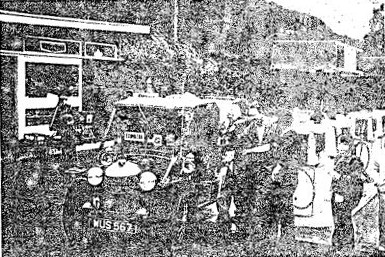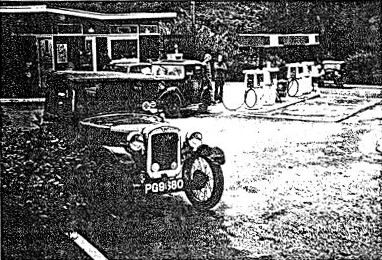Filling Station Closure
From Moriston Matters, Issue 17, February 1980.
EDITORIAL
IT HAS BECOME A LOCAL INSTITUTION

Pat the Pier's filling station with Sron na Muic in the
background
and in the foreground a generation of
well-known personalities.
And now Glenmoriston is experiencing the threat of the clinical axe of rationalisation. What Mr. Keith's words (see page 3) "… we maintain that the closure of Inver would have little or minimal effect on the community... ” illustrate is the seemingly unbridgeable gulf between the panoramic mind of the multinational giant and life in a small culturally viable community, the people in which have strong loyalties and have a strong sense of identity with the community. We do not advocate "parish pumpery" by any means, nor are the people of Glenmoriston (or any other small community) parochial, but the closure of any well and long-established institution is bound to have more than a "little or minimal effect on the community". There is the fundamental question of people's livelihoods and there is the fact that village institutions evolve to be a strength and source of sane values beyond their basic functions. The purely and narrowly economic rationalisation is hideous in its poverty.
We confess to no knowledge of the legal requirements in the closing of a petrol station, and little knowledge of economics, but we find something chilling about Esso's legal obligations to fill in the tanks. One could see the force of this if it had been finally established that a petrol station would never again be used as a petrol station. But suppose another company were willing to supply the tanks - then surely it would be common-sense for Esso to transfer the entire premises to a buyer willing to continue the business. Expressing the intention of neutralising a service without apparently considering a reasonable alternative seems to be a needless destruction of a resource. Or, are we being naive?
INVER SERVICE
As is widely known now, in December, 1979, Esso, after about 90 years of trading with Peter MacDonald & Sons of Glenmoriston, decided to close the Inver Service Station. The closure will take place on the 30th Sept., 1980 and not June as earlier reported in the press.
The community of Glenmoriston, and further afield, were considerably dismayed by the news, as much, and indeed more, by how it would affect Pat MacDonald and his business as by thephysical inconvenience and extra expense the closure would mean, and a petition was organised and universally supported.
Pat MacDonald, in his fight to reverse Esso's decision, has contacted Mr Russell Johnston, M.P. for Inverness-shire, the Highlands and Islands Development Board, the Highland Regional Council and the Inverness District Council, and has received from them a significant measure of support. Pat has also secured from Glenmoriston Estates Ltd., a site on which to build an alternative station, for which planning permission now has been applied.

Inver Service Station for topping up.
On the 7th February, a meeting took place in Inverness between Mr Keith, Esso's Regional Manager in Scotland, and officials of the H.I.D.B., the Highland Region al Council and the Inverness District Council. But it seems that Esso have not budged from their decision to close the Inver Service Station.
"Moriston Matters" contacted Mr Keith, and haying explained the general function of the magazine, requested an answer to a few specific questions and invited him to make any other comment he wished. Mr Keith replied at some length. We asked him first if he would like to make any comment on "how a huge company looks on local communities". We print his reply in full:
"With the Inver Service Station situation focused on Esso Petroleum Company, in relation to our rationalisation policy, the judgement over what is or is not newsworthy in the media is not our decision.
After 92 years of trading in the U.K., we are indeed conscious of the needs of the local communities and we consider that our attitude is both sensible and responsible. There are over 50 oil companies in the U.K. and of these, there are only three or four operating in rural areas.
Our company, despite our size, is part of most local communities and that is a relation-ship we try to maintain.
We have an identified association with the retail trade and we cannot escape the market pressures upon us and every other company, whether it is retailing petrol, groceries, ironmongery or providing any of the myriad needs of a community. The whole market place is changing and as it is our firm intention to remain as retailers, we have to recognise the changes and move with the market".
Mr Keith then went on to explain Esso's view of the economics of the situation: basically that, "in the ever changing market of petrol retailing, it is better to have a limited number of strong rural outlets capable of surviving rather than a large number of weak ones". Mr Keith next volunteered a question, and answer, of his own. We publish these in full:
"What effect would the closure of Inver Service Station have on the surrounding community? Again we consider this very carefully and we maintain that the closure of Inver would have little or minimal effect on the community because of the availability of petrol at other locations in the area. Those who buy petrol at Inver are obviously motorists and therefore mobile outwith the immediate vicinity of Inver".
Finally, we raised with Mr Keith the question of the intention of Esso, as reported in the press, to move the pumps and "fill in" the tanks before the site and premises were placed on the market. We explained that this puzzled many people, and put the question: "Does it (moving the pumps and filling in the tanks) not smack of a 'dog in the manger' attitude?” We publish Mr Keith's reply in full:
"As far as filling in the tanks are concerned - that is actually a legal requirement when a service is being closed down".
STOP PRESS
The Community Council at its meeting on 19th Feb took up Pat's case and pledged its full support in his efforts to come to terms with the situation.